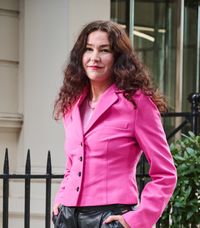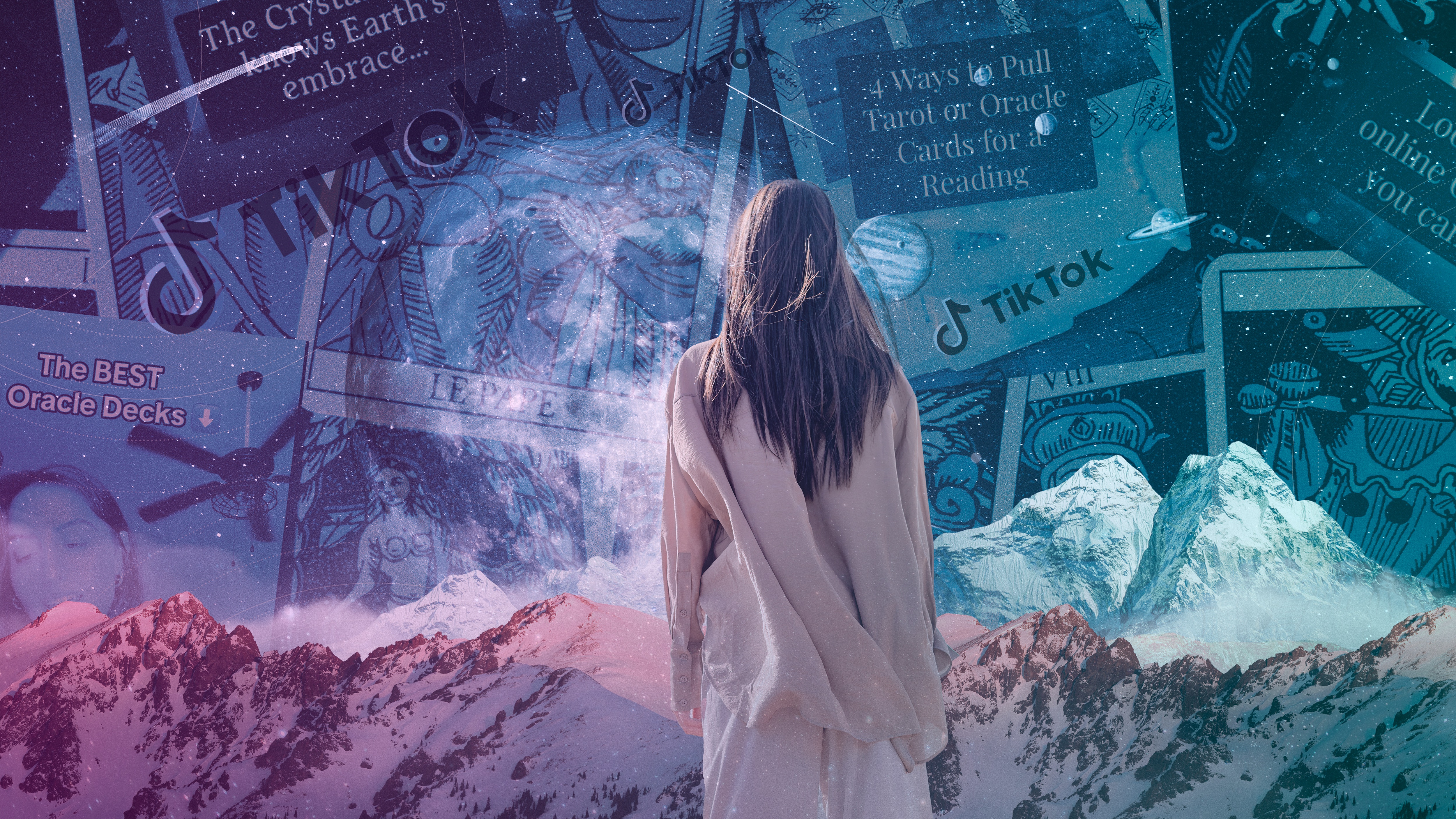Oracle Cards Are the New Self-Care—But Is Online Spirituality Helping Anyone?
Full moon mantras, astrology make-up, aura nails, and WitchTok: welcome to the era of algorithmic enlightenment


Oracle cards, astrology forecasts, guided meditations, crystal hauls—spirituality has carved out a glossy, fast-paced niche on TikTok. But is this a genuine spiritual renaissance or just another algorithmically fuelled aesthetic trend?
I recently RSVP’d to a launch celebrating the new aura-coloured collection of Stanley Cups; the clincher was the promise of aura readings. Like most millennials—and, I would hazard, most people—I yearn to be defined. Sure, I like the idea of moving through the world with an air of mystery—“Who is she?” I imagine passersby saying—but I also want to be seen, heard, understood. This is a fairly universal desire and probably has a lot to do with the endurance of anything that claims to offer it: astrology, tarot, Oracle cards.
Still, even as someone who’s not averse to the odd New Age idea, I can tell there’s been a notable shift in mysticism hitting the mainstream. That same week, on somewhat of a social streak, I clicked ‘attend’ on an event that promised dinner and tarot readings—a harmonious pairing I’d discovered last year at a dinner in Bali. The thing is, though, Bali is a country famous for its spirituality, not a new North London hangout. All of which is to say: what’s behind all the woo-woo?
Take Oracle cards, for example, which are booming on TikTok with 16.1 million posts tagged under #OracleCard. Content on the platform varies, but one of the most popular formats sees users post “card pulls,” where they draw one or more cards live, offering advice or predictions for themselves or their audience.
Posts often include themes of self-love, manifestation, healing, and spiritual connection, and while creators typically offer free readings, there’s usually a prompt to encourage followers to comment for a personalised message (at a charge).
I’m not the only one whose ‘For You Page’ is starting to feel like a digital altar lately, either. “I don’t know if it was because I needed something,” says 34-year-old *Jenna Lidell, “but when I broke up with my ex, these tarot readers started cropping up on Instagram.” She watched a few. Then a few more. Soon, her feed was full of cards, candles, and women with confident voices saying things like, “They’re thinking about you. They regret what they did.”
“It kind of validated how I felt,” she admits. “They really do suck you in. They say the same thing in 1,000 different ways, but they get quite addictive when you’re in a mind space where you need some validation.”
Celebrity news, beauty, fashion advice, and fascinating features, delivered straight to your inbox!
She’s not alone. In a world increasingly defined by crisis—climate collapse, economic precarity, social injustice, a turbulent 24/7 news cycle—it’s not surprising that people are reaching for meaning.
“I definitely see it,” says Semra Haksever, a self-described Electric Witch and founder of Mama Moon Candles. “People are looking for faith to help them through. Believing that there might be higher forces at play can both take the edge off believing that humans can be so cruel and also offer respite that something good is coming.”
Rebecca Moore, a wellness expert and author of Radical Self-Care, agrees: “In a world that feels increasingly disorienting, people are reaching for practices that anchor them in something real and true.”
Critics, though, argue that the boom in spirituality is more about aesthetics and curated crystal grids than self-actualisation. Pinterest has noticed an uptick (+1,598%) in Libra make-up alone, prompting the platform to highlight ‘astrology make-up’ in its Summer Trend Report, along with ‘summer aura nails,’ which are up +277%.
The viral spiritual content flooding social media often blends ancient symbols with influencer tropes. As Semra points out, “The only problem with modern-day spirituality that we see online is that it is based around Western capitalistic individualism… it kind of misses the point that sharing a faith should be that we are all working for the greater good.”
Zak Avery, Community & Culture Director at Shoreditch-based wellness hub &Soul, has noticed the same hunger showing up in the real world. “From ecstatic dance and breathwork to sauna ceremonies and dynamic meditations, there’s a growing appetite for experiences that foster inner connection,” he says. “These aren’t just trends. They’re responses to very real mental and emotional needs in our society.”
Leila Sadeghee, a priestess and energy worker, argues that deep spiritual work truly shifts how we engage with the world. “Rather than falling prey to your darker thoughts or being mesmerised by every little disturbance of emotion,” she says, “you learn to see beyond the surface of your experience… You stop looking for exits.”
However, like any algorithm-fuelled trend, what begins as support can slide into simulation. For Jenna, this looked like reels of AI-generated tarot readers. “That’s when I realised it had gone a bit too far and I needed to stop engaging with this content,” she says.
Others have noticed issues with online spiritual practices. “The spiritual space is largely unregulated,” warns Jill, co-founder of East London spiritual studio She’s Lost Control. “And people often come to it when they’re vulnerable or seeking answers.”
This is the paradox of online spirituality: it makes ancient practices accessible in ways never seen before, but also threatens to flatten them into trends, shoppable links, and 60-second explainers.
“There’s a noticeable rise in online spirituality,” says Liza Al Sady, founder of We the Conscious Studio. “But it’s not just about the resurgence of ancient practices. It’s about a collective reckoning with how disembodied modern life has become. We’re more disconnected than ever—from our bodies, our emotions, each other.” In her view, people aren’t turning to breathwork because it’s trending: “They’re burnt out, alienated, and quietly overwhelmed. They’re not looking for enlightenment—they’re looking for relief.”
That sentiment resonates deeply with Cameron Tewson, whose lifelong fascination with psychics took on a new weight when his partner died suddenly in 2024. “In the midst of my ongoing grief, I found immense comfort in connecting with him through a medium,” he says. “It gave me a chance not only to feel closer to him, but also to seek understanding about what had happened. It brought clarity and peace during an otherwise heartbreaking time.”
Cameron wasn’t influenced by social media, but he has noticed spiritual content following him around online. The algorithm always knows.
This spiritual turn isn’t entirely new—mysticism has always surged in turbulent eras. What’s new is the delivery: bite-sized, algorithmically optimised doses of meaning. And while sceptics may dismiss it as commercialised esotericism, for many young people, it’s offering something they’re not finding in traditional institutions: hope, connection, and a sense of purpose.
“What’s changed,” says Jill, “is the nature of the search. We’re now seeing people coming to spirituality not just for individual healing, but to process collective challenges like eco-anxiety, social injustice, and financial instability.” She believes that when done consciously, spiritual practices can support mental health and resilience. “But they should never promise a shortcut to healing.”
Of course, not all spiritual seekers are lost in a woo-woo wormhole. “Sometimes when you don’t know what way to look, you need someone to guide your focus and tell you what to do,” says Jenna. “And these women felt like they were talking to me. Which, in a weird way, was comforting.”
So, is the spiritual resurgence just another algorithmic aesthetic? A coping mechanism wrapped up in #cosmicvibes? Or something deeper — a sign of a culture grasping for meaning in the middle of collective collapse?
Maybe the answer is about how we use it. Whether it’s oracle cards, breathwork, or a TikTok spell under the full moon, the focus should be less about what we’re reaching for and more about why, and whether we’re willing to go beyond the scroll.

Mischa Anouk Smith is the News and Features Editor of Marie Claire UK.
From personal essays to purpose-driven stories, reported studies, and interviews with celebrities like Rosie Huntington-Whiteley and designers including Dries Van Noten, Mischa has been featured in publications such as Refinery29, Stylist and Dazed. Her work explores what it means to be a woman today and sits at the intersection of culture and style. In the spirit of eclecticism, she has also written about NFTs, mental health and the rise of AI bands.